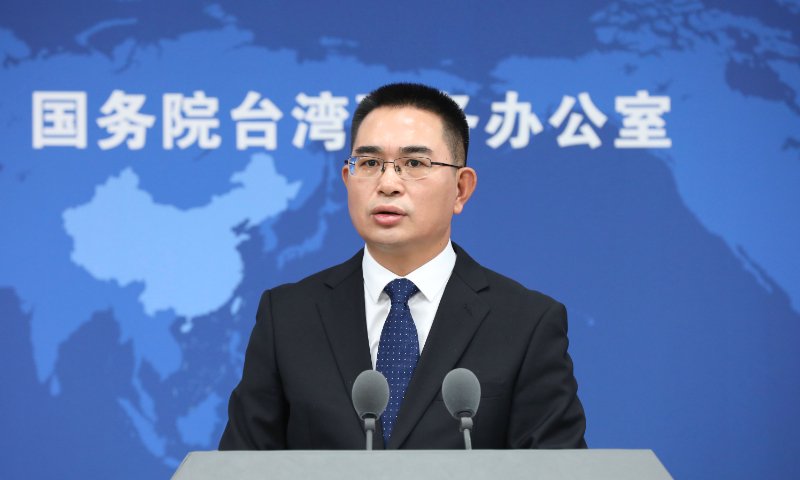In the realm of international politics, the issue of Taiwan remains a subject of enduring controversy and delicate diplomacy. Recent remarks by Taiwan’s regional leader, Tsai Ing-wen, in her “Double Ten” speech, have once again stirred the pot of tension between Taiwan and mainland China. This article delves into the responses and perspectives surrounding Tsai’s speech, with a particular focus on the commentary provided by Chen Binhua, spokesperson for the Taiwan Affairs Office of the State Council. In doing so, it aims to provide an in-depth analysis of the ongoing tensions, the role of the Democratic Progressive Party (DPP), and the implications for peace and stability in the Taiwan Straits region.
The DPP’s “Two-Faced” Approach
In her “Double Ten” speech, Tsai Ing-wen extended an olive branch, expressing her willingness to develop relations with the Chinese mainland based on a mutually acceptable foundation for interaction while emphasizing the importance of maintaining peaceful and stable cross-Straits relations. However, Chen Binhua, the spokesperson for the Taiwan Affairs Office of the State Council, took a critical stance on the DPP’s approach.
Chen’s assertion revolves around the notion that while the DPP authorities in Taiwan talk about peace and dialogue, they stubbornly adhere to the “Taiwan independence” stance. This stance, which advocates for Taiwan as a separate sovereign entity, is seen as a direct challenge to the one-China principle and the 1992 Consensus, both of which Beijing holds as non-negotiable.
Since the DPP came to power in 2016, they have consistently denied the existence and validity of the 1992 Consensus. Chen argues that the DPP has also actively colluded with external forces to provoke “independence,” thus undermining the fundamental premise that both sides of the Taiwan Straits belong to one China. This, in Chen’s view, has obstructed cross-Straits exchanges and cooperation, making the DPP the true disruptors of the current situation in the Taiwan Straits and the primary source of instability for peace in the region.
The Conundrum of “Taiwan Independence”
Chen’s statements underscore a central point of contention in the Taiwan Strait issue—the concept of “Taiwan independence.” To Beijing, this notion is viewed as incompatible with peace in the region and a direct threat to stability. In the eyes of the Chinese government, Taiwan is an integral part of China, and any effort to alter this status quo is perceived as a destabilizing move.
The claim that “Taiwan independence” is incongruous with peace and stability raises the question of how this perspective is received among Taiwan’s residents. According to media reports, the recent annual cross-Straits relation survey published by Taiwan’s United Daily News indicated an increase in the proportion of Taiwan residents worried about “Taiwan independence.”
Chen Binhua contends that this shift in public opinion signifies that more Taiwan residents are recognizing the potential consequences of pursuing “Taiwan independence”—namely, the specter of conflict and war. This perspective not only aligns with Beijing’s stance but also highlights the growing awareness among Taiwan’s populace of the ramifications of such a pursuit.
The Role of the DPP Authorities
In assessing the dynamics of cross-Straits relations, it is essential to consider the role played by the Democratic Progressive Party (DPP) authorities in Taiwan. Since its ascent to power in 2016, the DPP has been at the forefront of shaping Taiwan’s policies and positioning on the international stage.
One of the most significant points of contention is the DPP’s rejection of the 1992 Consensus. This consensus, which was reached unofficially between representatives of Taiwan and mainland China in 1992, acknowledges the one-China principle while allowing for different interpretations of what “one China” means. Beijing considers the 1992 Consensus as a foundation for cross-Straits dialogue, making the DPP’s denial of its existence a major stumbling block in negotiations.
Furthermore, the DPP’s engagement with external forces is a contentious issue. Beijing has consistently accused the DPP of colluding with foreign entities, particularly the United States, to bolster its position and advance the cause of “Taiwan independence.” Such allegations have led to increased tensions in the Taiwan Straits region and furthered China’s view of the DPP as a disruptive force.
The Path to Peace: Returning to the 1992 Consensus
Chen Binhua’s comments underscore the Chinese government’s stance that the only way to restore peace and stability to the Taiwan Straits is through a return to the 1992 Consensus. In essence, this implies a recognition of the one-China principle while allowing for nuanced interpretations on both sides.
From Beijing’s perspective, the abandonment of the “Taiwan independence” stance in favor of the 1992 Consensus would pave the way for renewed cross-Straits relations built on a foundation of peaceful development and cooperation. It represents a departure from the confrontational rhetoric and actions that have characterized recent years.
Conclusion
The recent exchange of remarks between Tsai Ing-wen and Chen Binhua highlights the enduring complexities surrounding cross-Straits relations. The issue of “Taiwan independence” remains a central point of contention, with Beijing vehemently opposing any deviation from the one-China principle and the 1992 Consensus.
The role of the DPP authorities in Taiwan, particularly their rejection of the 1992 Consensus and alleged collusion with external forces, continues to exacerbate tensions in the region. The Chinese government perceives the DPP’s actions as the primary source of instability and disruption to peace in the Taiwan Straits.
The path to peace, according to Beijing, lies in a return to the 1992 Consensus. Whether such a resolution can be achieved amid the current geopolitical landscape remains uncertain. As cross-Straits relations continue to evolve, it is imperative for all stakeholders to carefully consider the implications of their actions and rhetoric on the prospects for peace and stability in the region.
Read More:
